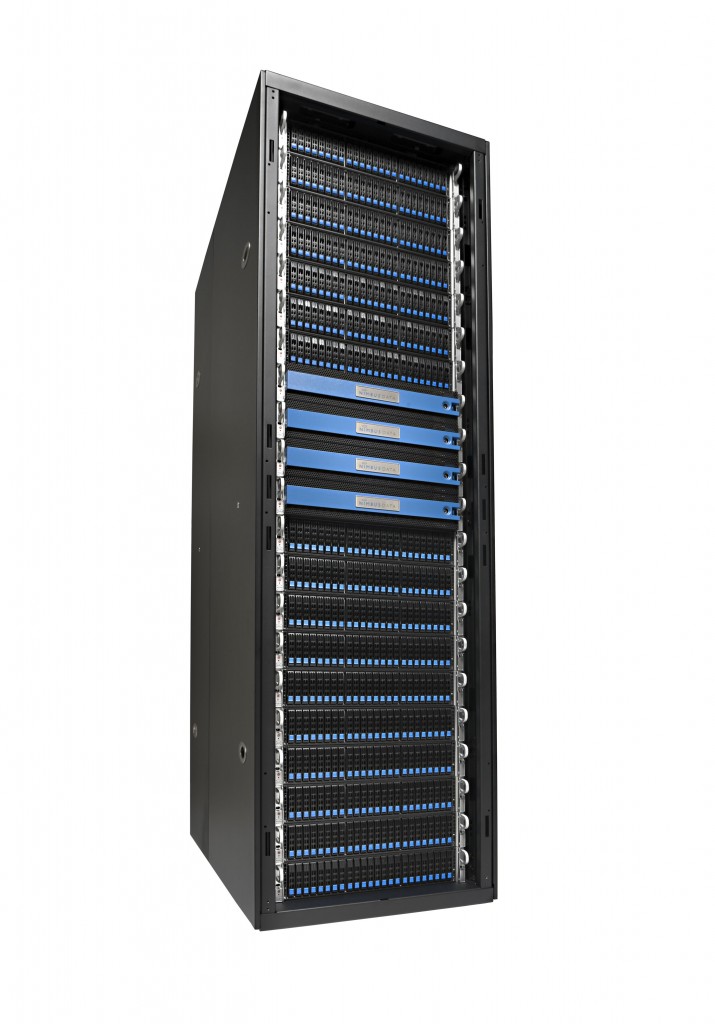Nimbus Data, well known for their enterprise storage systems, has unveiled their new E-Series storage array. The E-Class products will offer software support for iSCSI, FibreChannel, Infiniband, 1Gbe and 10 Gbe interfaces.
In addition, they will be compatible with both NFS (network file system) and CIFS (common internet file system). The new product can also function as a giant RAID device, and includes RAID 5, 6, and 10 functionality which is inherent to the array’s ability to scale from 10TB to 500TB.
The hardware underlying this plethora of protocols consists of two redundant controllers and up to 24 SSD enclosures. The brains of the whole operation is the Nimbus HALO operating system, which handles things like balancing drive utilization and fault tolerance, allowing the seamless transition to redundant solid state storage devices if the worst does happen.
Unlike many enterprise systems which are utilizing PCIe SSDs in the pursuit of maximum performance, Nimbus is employing a more traditional approach by integrating conventional SAS modules. Although this solution may not be quite as fast as something that utilizes PCIe SSDs, it’s far more flexible, facilitating easy expansion of the array at a moments notice, not to mention allowing better integration with existing storage systems. Another benefit is that it enables the E-Class to be the densest data storage solution available today, allowing 20TB of storage to fit in 2U of rackspace.
It definitely seems that balance and efficiency are the main ideas here because, in addition to the more standard SSD modules, Nimbus is utilizing eMLC in lieu of SLC, which should reduce costs quite a bit while still maintaining that critical enterprise class reliability. In fact, it seems that cost is at the very heart of the matter when it comes to Nimbus’ new offering as the array will use only 5 watts of power per terabyte.
 Even more interesting is the fact that the solid state storage will ring in at only 10$ per gigabyte which is a paltry amount by enterprise standards. This price compares well to competing solutions that utilize high speed 15k HDDs which have significantly lower performance. Indeed, it seems the consumer space isn’t the only area in which SSD prices are dropping, with reductions apparently covering the whole industry. From 32GB boot drives with mail-in rebates to multi-terabyte ssd arrays valued at six figures or more, it appears that all corners of the market are benefiting from the rapid expansion and subsequent cost reductions of solid state storage.
Even more interesting is the fact that the solid state storage will ring in at only 10$ per gigabyte which is a paltry amount by enterprise standards. This price compares well to competing solutions that utilize high speed 15k HDDs which have significantly lower performance. Indeed, it seems the consumer space isn’t the only area in which SSD prices are dropping, with reductions apparently covering the whole industry. From 32GB boot drives with mail-in rebates to multi-terabyte ssd arrays valued at six figures or more, it appears that all corners of the market are benefiting from the rapid expansion and subsequent cost reductions of solid state storage.
Now if only the consumer space could be more like the enterprise sector when it comes to copious amounts of capacity. Not to worry, at the rate the market is progressing, we’ll all have our own personal SSD based datacenters in no time, and in a form that won’t require any room filling rackspace.
See press release on next page………
 The SSD Review The Worlds Dedicated SSD Education and Review Resource |
The SSD Review The Worlds Dedicated SSD Education and Review Resource | 